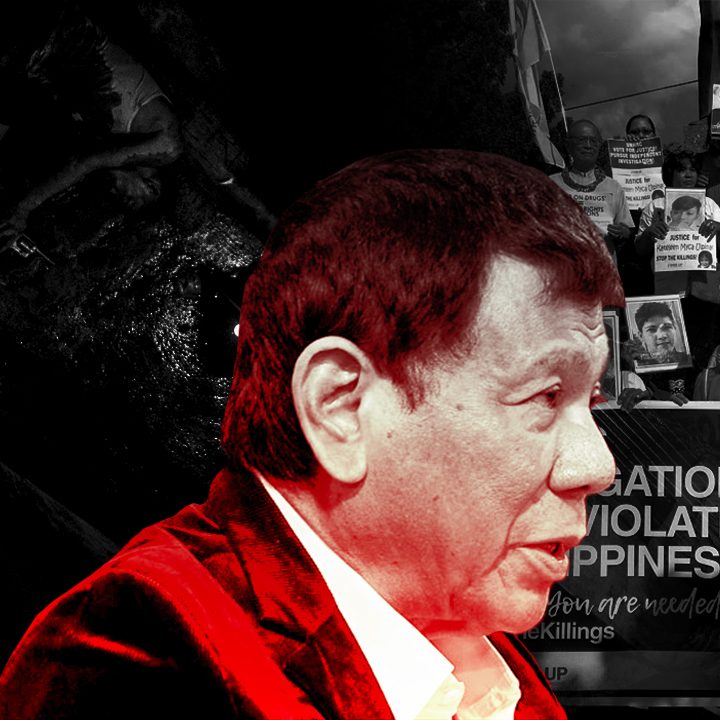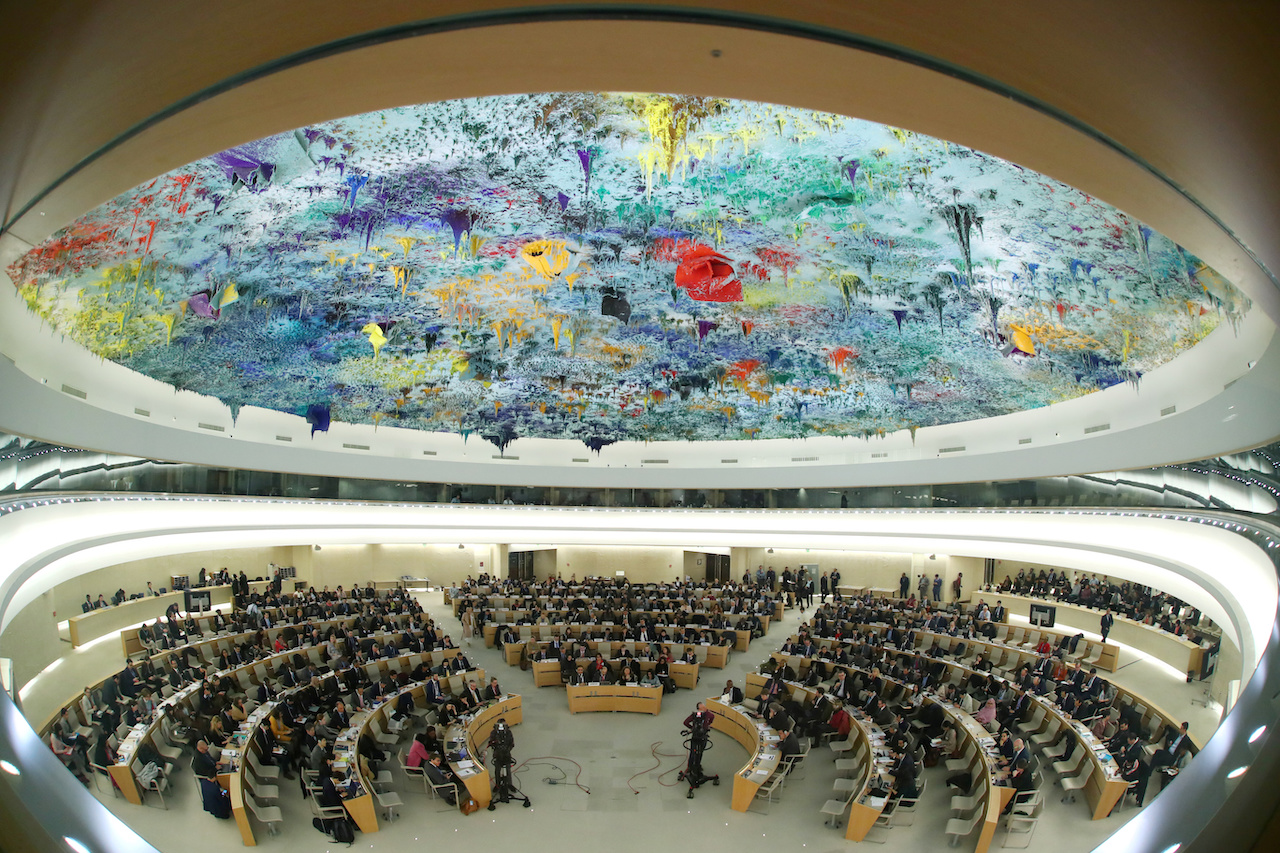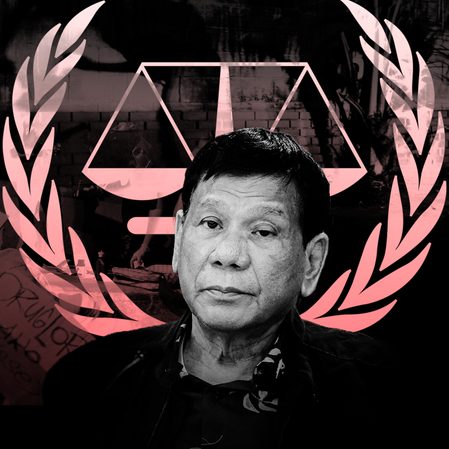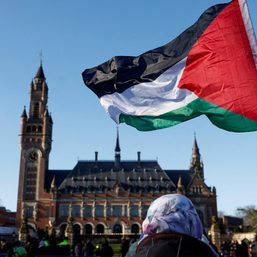SUMMARY
This is AI generated summarization, which may have errors. For context, always refer to the full article.

The International Criminal Court (ICC) investigation into the drug war killings highlights the need for the United Nations Human Rights Council (UN HRC) to take stronger action against violence and impunity under President Rodrigo Duterte.
It further highlights the misstep of the UN HRC in October 2020 when it only offered “technical assistance” to the Duterte government accused of widespread human rights violations. It could have instead looked at a full investigation into these violations. (READ: UN resolution lacks ‘more meaningful actions’ vs killings, abuses under Duterte – groups)
Rose Trajano, steering committee member of rights group In Defense of Human Rights and Dignity (iDEFEND), recalled how they were “very frustrated” by the content of the UN HRC resolution.
“Disappointed kami noon kasi ang panawagan ay (We were very frustrated and disappointed since we appealed for) international inquiry and fact-finding mission because they have that mechanism,” she told Rappler.
Trajano, a long-time human rights worker, said their calls to the council were always the same: Investigate the Duterte government in a bid to stop violence in the Philippines.
By September 30, 2020, before the UN adopted the resolution, at least 5,903 suspected drug personalities were already killed in police operations alone. UN rights chief Michelle Bachelet even released a scathing report, saying, among others, that the drug war is being carried out “without due regard for the rule of law, due process, and human rights.”
Almost a year after, on September 15, 2021, the ICC pre-trial chamber renewed scrutinity on the drug war, announcing that it was authorizing a full investigation that would cover killings both nationwide and in Davao City between 2011 and 2016, when Duterte was mayor and vice mayor.
It found reasonable basis for Prosecutor Karim Khan to probe into the situation “in the sense that the crime against humanity of murder appears to have been committed, and that potential case(s) arising from such investigation appear to fall within the Court’s jurisdiction.”
“At least nasa pintuan na tayo ng victory, of a long battle, kaya tuwang-tuwa kami kasi in spite of the weak UN HRC resolution, nakakuha tayo ng mas malawak na mechanism for justice and accountability,” Trajano said.
(At least we are now at the doorstep of victory, of a long battle, that’s why we are happy because in spite of a weak resolution, we were able to get a wider mechanism for justice and accountability.)
Ball on right council’s court
The UN HRC recently began its 48th Session and all eyes will be on what it will do next, considering the latest ICC development. UN human rights chief Bachelet is expected to update the council in the first week of October about the implementation of the “technical assistance” given to the Philippines.
International law expert Param-Preet Singh, associate director of the Human Rights Watch’s international justice program, said that the ICC probe into possible crimes against humanity in Duterte’s war on drugs “puts the ball on UN HRC’s court to follow up directly.”
“This is in a way a test for the governments at the UN HRC… If they are serious about human rights, then they have to ensure that there’s a robust accountability mechanism to document what’s happened to victims in the Philippines,” she told Rappler.
More importantly, the UN HRC can step in and cover what the investigation may leave out – specifically the killings that happened beyond the period the ICC indicated. The pre-trial chamber said that the Office of the Prosecutor can only investigate crimes committed between November 1, 2011 and March 16, 2019.
The Philippines’ withdrawal from the ICC took effect on March 17, 2019, a year after Duterte started the process in response to the preliminary examination launched by then-prosecutor Fatou Bensouda. The ICC’s jurisdiction only covers crimes committed when a country was a member-state.
“There is a big gap, that’s more than two-and-a-half years and abuses have continued, if not escalated,” Singh said.
Government data shows that at least 6,181 alleged drug personalities were killed in police anti-illegal drug operations between July 1, 2016 to July 31, 2021. Human rights groups peg the number of deaths between 27,000 and 30,000, to include victims of extrajudicial killings. (READ: The Impunity Series)
The ICC pre-trial chamber noted in its decision that the Philippine Drug Enforcement Agency “publicly communicated” that 5,281 people were already killed by February 28, 2019.
This means that at least 900 drug war-related deaths are no longer covered by the ICC. This number does not even give the full picture, as the Duterte government is notorious for its lack of transparency in its drug war operations. (READ: How the Duterte government underreports drug war killings)
“[The UN HRC] cannot shirk their responsibility to deliver accountability simply because the ICC has opened an investigation because if anything, it should inform their urgency to act,” Singh said.

‘Credibility test’
Both the ICC and the UN are independent bodies but they are “supranational organizations which operate within the same plane of the universe,” human rights lawyer Krissy Conti said.
“They have actually agreed to cooperate, share information with each other,” she told Rappler.
Conti is the legal counsel of Rise Up for Life and for Rights, a group of mothers and wives whose loved ones were killed in Duterte’s violent drug war. They are one of the organizations that filed communications before the ICC, calling for an investigation into the killings.
In a legal document that entered into force in 2004, the UN and the ICC agreed “that, with a view to facilitating the effective discharge of their respective responsibilities, they shall cooperate closely, whenever appropriate, with each other and consult each other on matters of mutual interest.”
The UN Security Council can also refer to the ICC country situations where crimes are committed, according to Article 13 of the Rome Statute, the treaty that created the court.
But the UN, including its rights council, is also troubled by internal politics and moves for self-preservation, especially in the face of human rights crises seen all over the world.
Amnesty International’s Philippines researcher Rachel Chhoa-Howard told Rappler that to some degree, there’s a lack of political will among member-states to hold other nations accountable.
This often results in weak action that fails to address problems, such as the October 2020 resolution that offered “technical assistance” to the Philippine government.
“That [resolution] might work when you have a government that is serious about ending human rights violations but you have here a government that’s actually actively involved in committing them for a very long time,” she told Rappler.
The situation in the Philippines already merits an investigation from the council: There is “little progress” to improve dire human rights situation in the country, while there is no “clear and measurable outcome” from domestic mechanisms. (READ: In Duterte’s drug war, justice is ‘nearly impossible’)
“The governments who negotiated for [the October 2020] resolution now have the responsibility to act now that there’s no radical improvement in the situation,” she said. “They are facing a credibility test.”
Time to act
For Conti, even if the ICC investigation will not directly pressure the UN or any of its bodies, “it should at least compel them to look closer into the domestic human rights review.”
Local efforts to investigate and hold perpetrators responsible have been slow moving, if not moving at all. Families and human rights groups continue to face challenges in filing cases, aside from having a hard time obtaining documents to even help investigations.
The ICC pre-trial affirmed this reality in the country – it said “authorities have failed to take meaningful steps to investigate or prosecute the killings.”
Only one case – the killing of 17-year-old Kian delos Santos in 2017 – has seen conviction, while the Department of Justice’s much-vaunted inter-agency drug war review panel is yet to deliver significant output as it continues to reject calls to release its full report. (READ: Duterte gov’t insists there is working justice in drug war but can’t show proof)
Karapatan secretary-general Cristina Palabay said the cases reviewed by the DOJ are “a mere drop in the bucket of reported drug war killings.”
The culture of impunity seen from the drug war perspective is just one part of the wider culture of violence seen in the Philippines since 2016. The drug-related deaths are on top of the killings of human rights defenders, lawyers, and local chief executives.
Many, if not all, of these deaths have yet to be solved. Human rights groups fear that the anti-terror law and the government’s intensified crackdown on dissent will worsen the situation in the Philippines. (READ: Duterte ushers in new level of danger for activists, human rights defenders)
“It is frustrating and disheartening if the UN HRC continues to disregard calls from those on the ground and by international bodies such as the ICC,” Palabay said.
Can we expect more from the UN HRC? – Rappler.com
Add a comment
How does this make you feel?

![[PODCAST] Law of Duterte Land: ICC probes drug war. What happens now?](https://www.rappler.com/tachyon/2021/09/Law-of-DuterteLand-PROMO-sq.jpg?fit=449%2C449)


![[The Slingshot] Lito Patay’s 4 hours and 38 minutes of infamy](https://www.rappler.com/tachyon/2024/07/Lito-Patay-4-hours-infamy-July-19-2024.jpg?resize=257%2C257&crop=233px%2C0px%2C720px%2C720px)

![[The Slingshot] A Duterte and Bato cop named Patay](https://www.rappler.com/tachyon/2024/06/tl-lito-patay.jpg?resize=257%2C257&crop=322px%2C0px%2C720px%2C720px)






![[Vantage Point] The PDEA leaks](https://www.rappler.com/tachyon/2024/05/vantage-point-pdea-probe.jpg?resize=257%2C257&crop=255px%2C0px%2C720px%2C720px)
![[Edgewise] How Duterte can elude ICC arrest](https://www.rappler.com/tachyon/2024/05/thought-leaders-How-Duterte-elude-icc-arrest.jpg?resize=257%2C257&crop=272px%2C0px%2C720px%2C720px)
![[OPINION] Rodrigo Duterte and his ‘unconditional love’ for China](https://www.rappler.com/tachyon/2024/04/rodrigo-duterte-xi-jinping-august-2019.jpeg?resize=257%2C257&crop=91px%2C0px%2C900px%2C900px)







There are no comments yet. Add your comment to start the conversation.